Charles E W Bean, Diaries, AWM38 3DRL 606/269/1 - 1918 - 1936 - Part 6
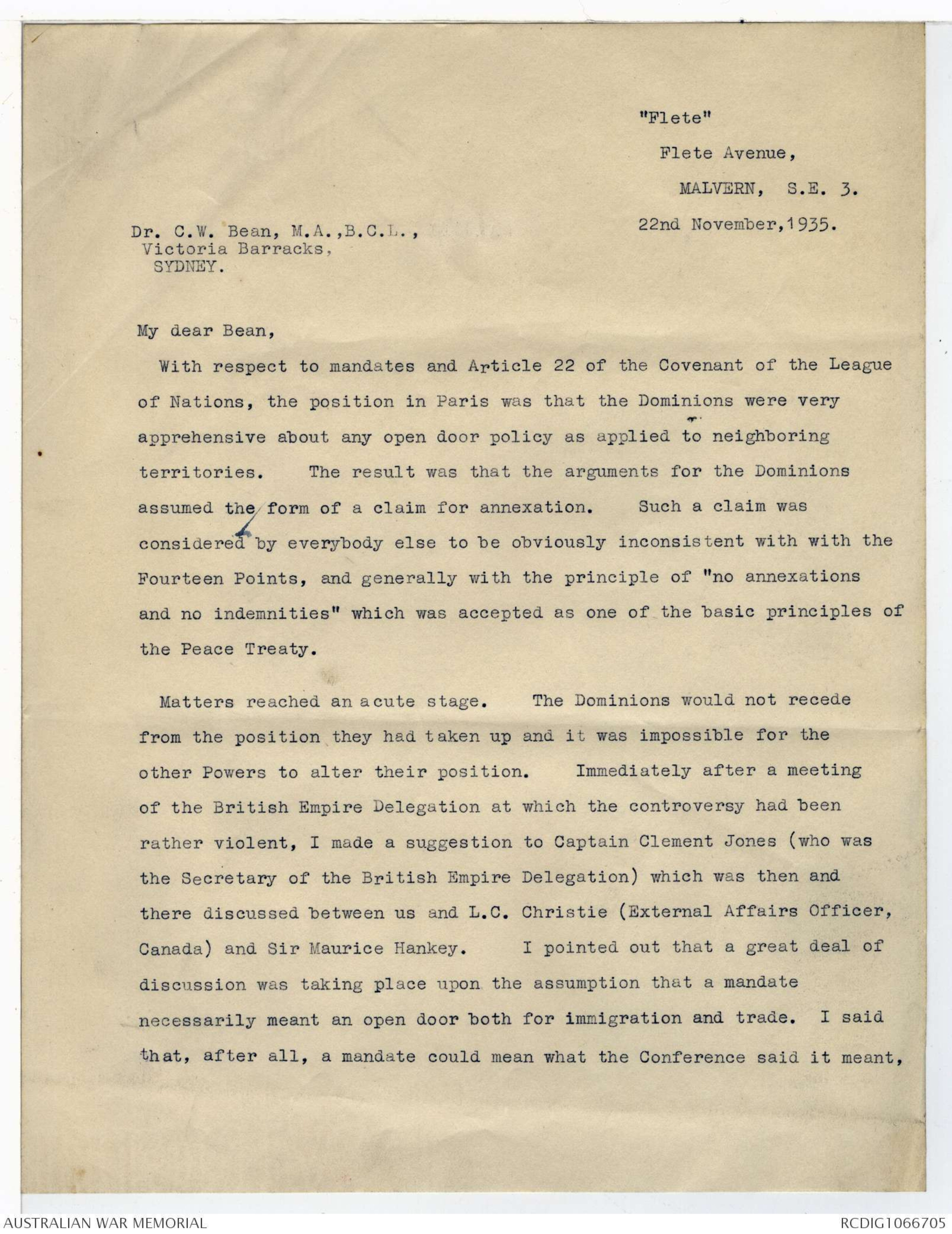
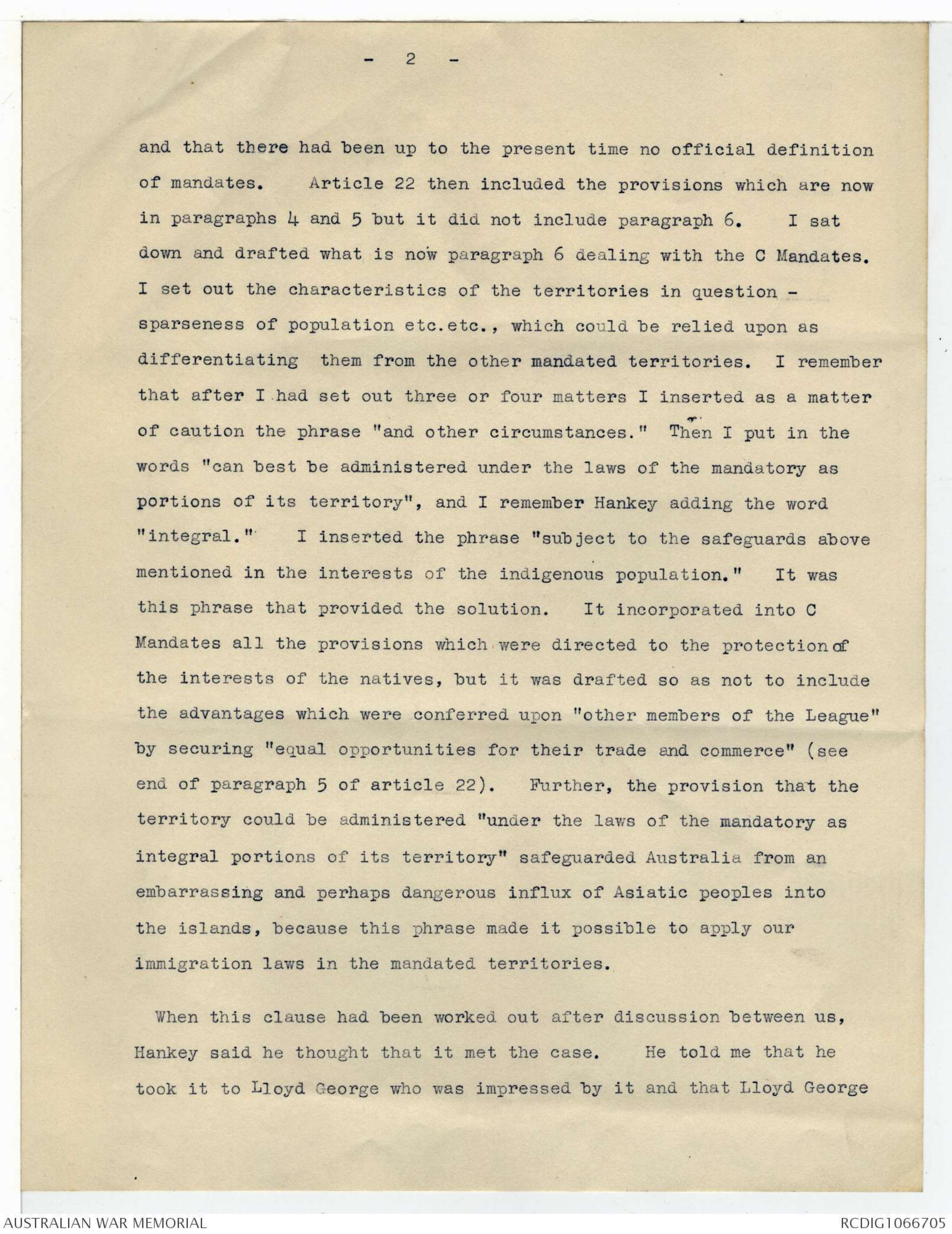
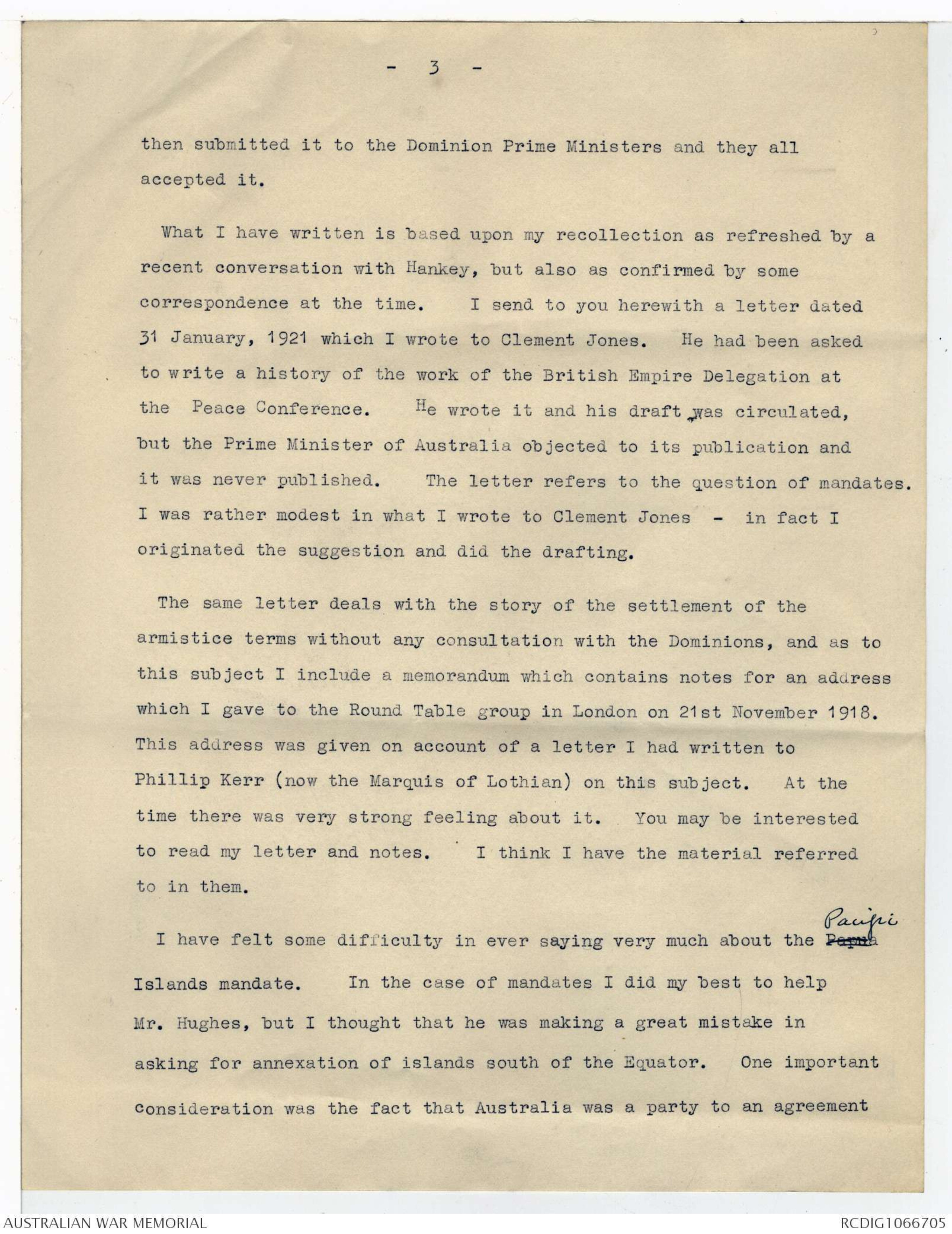
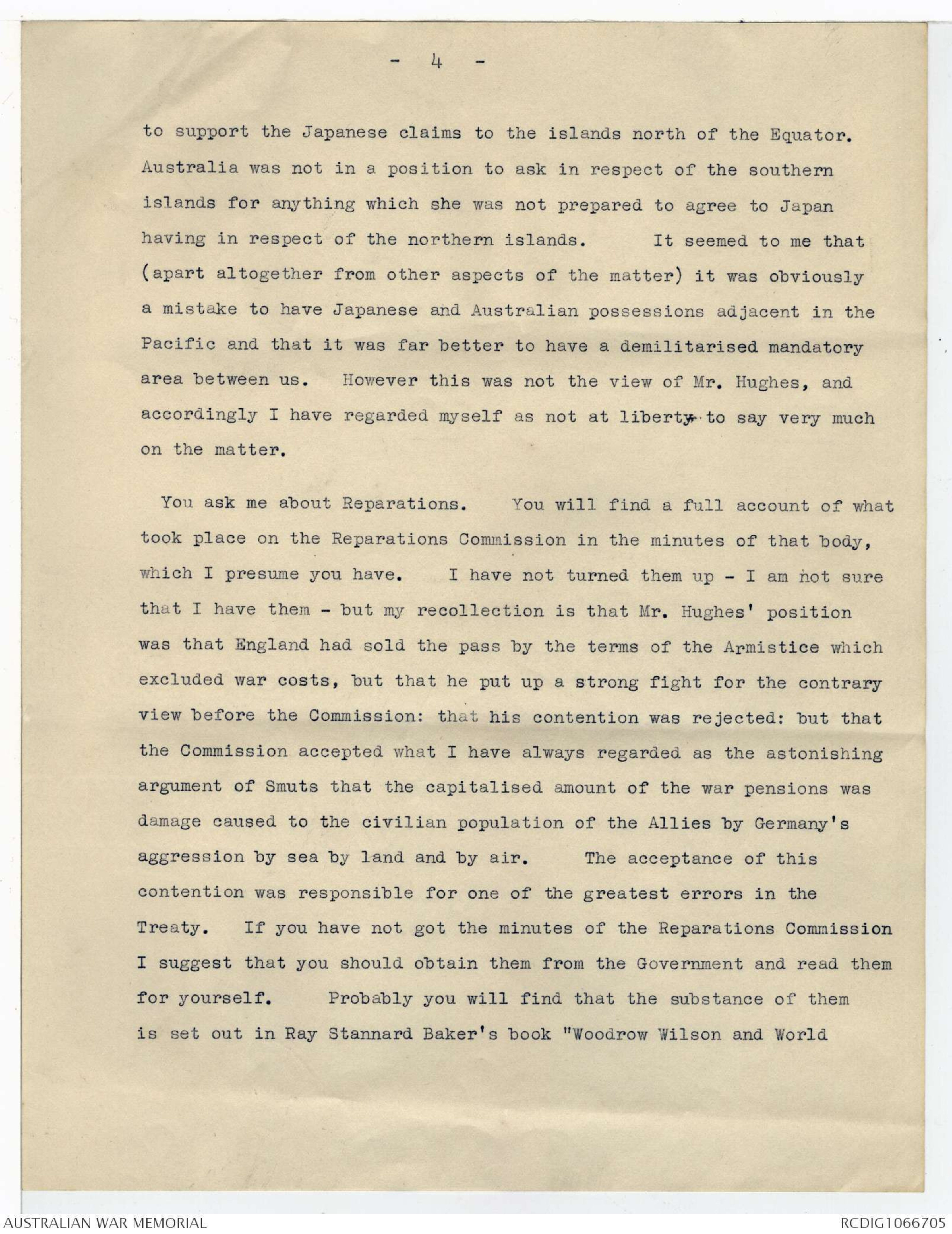
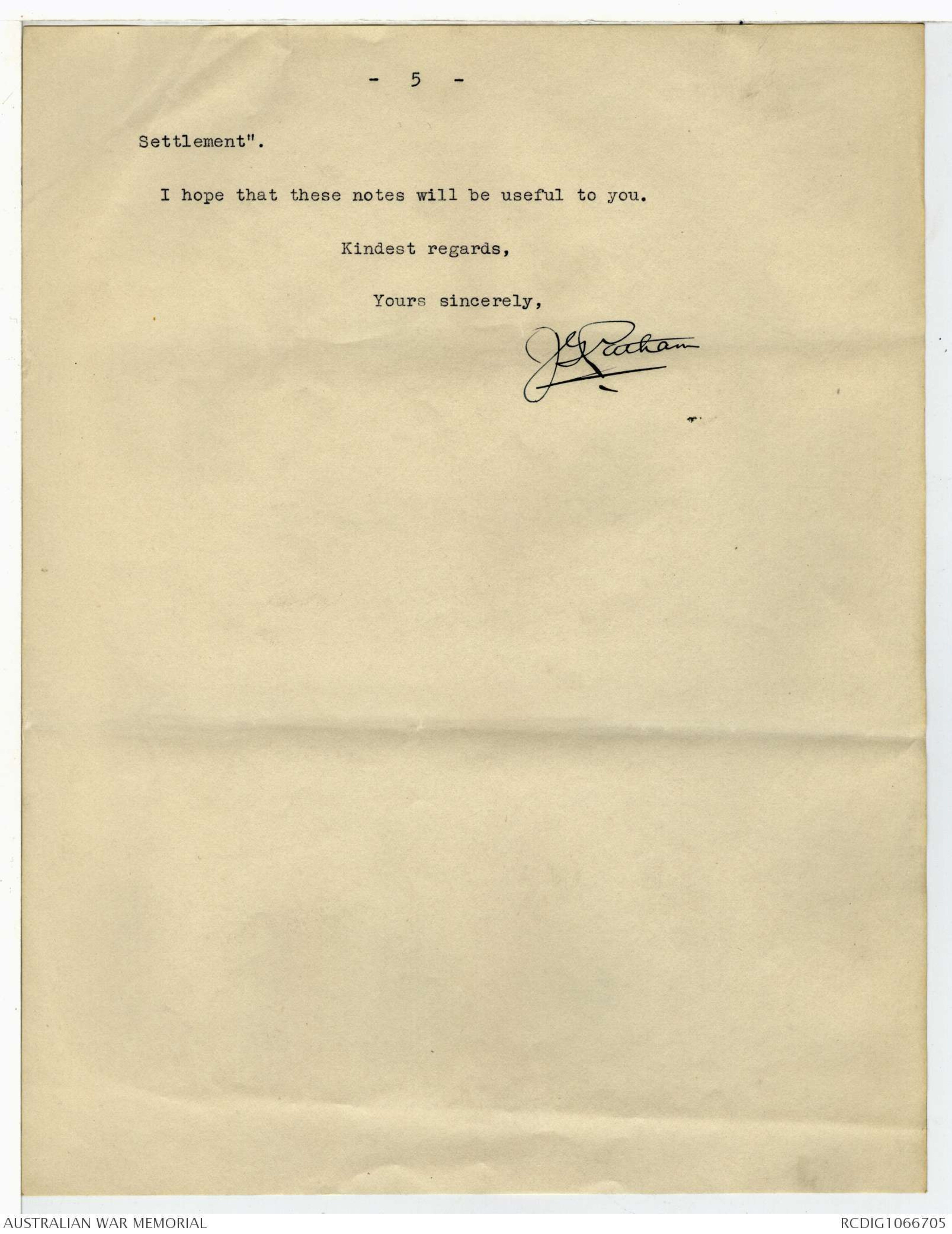
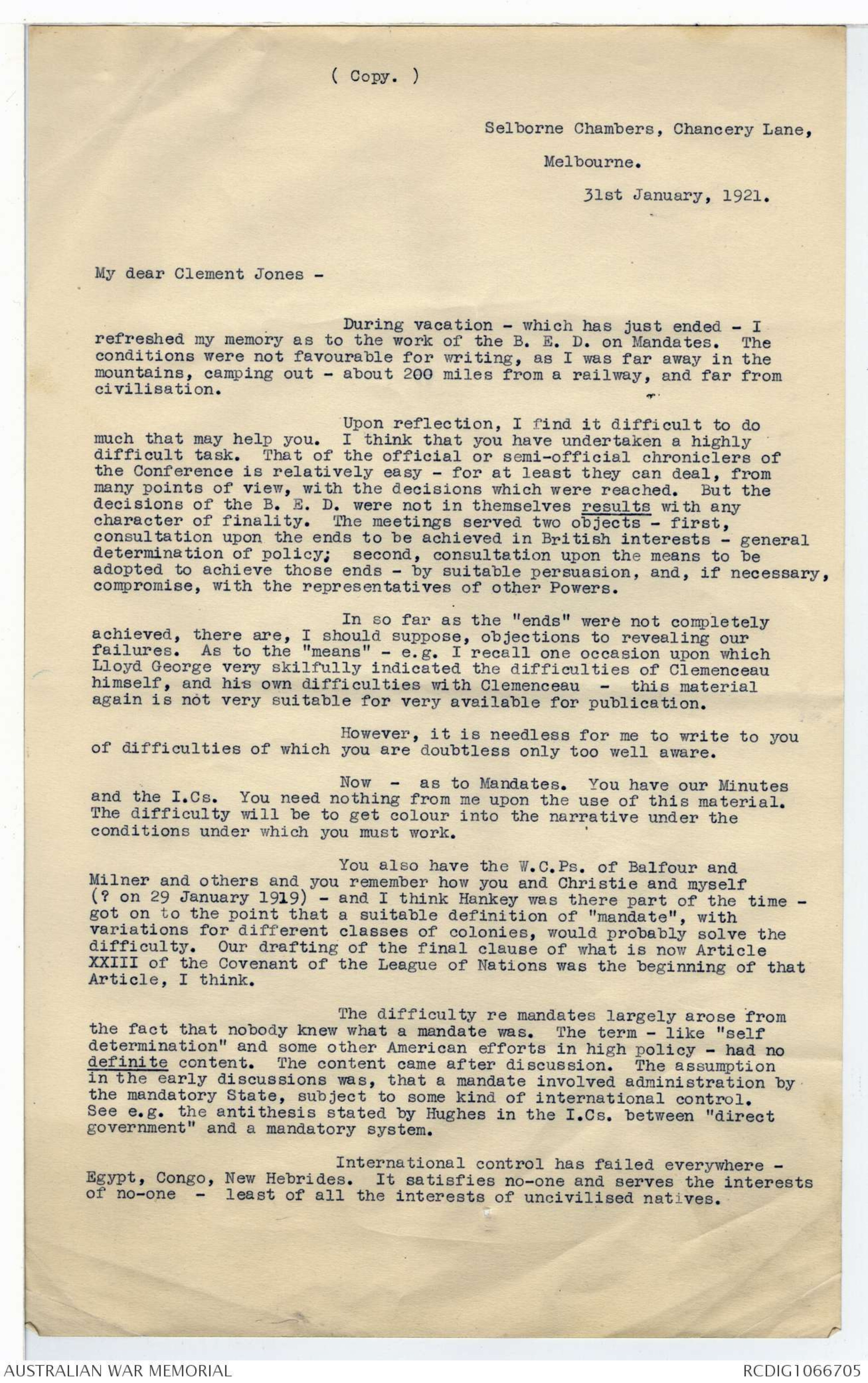
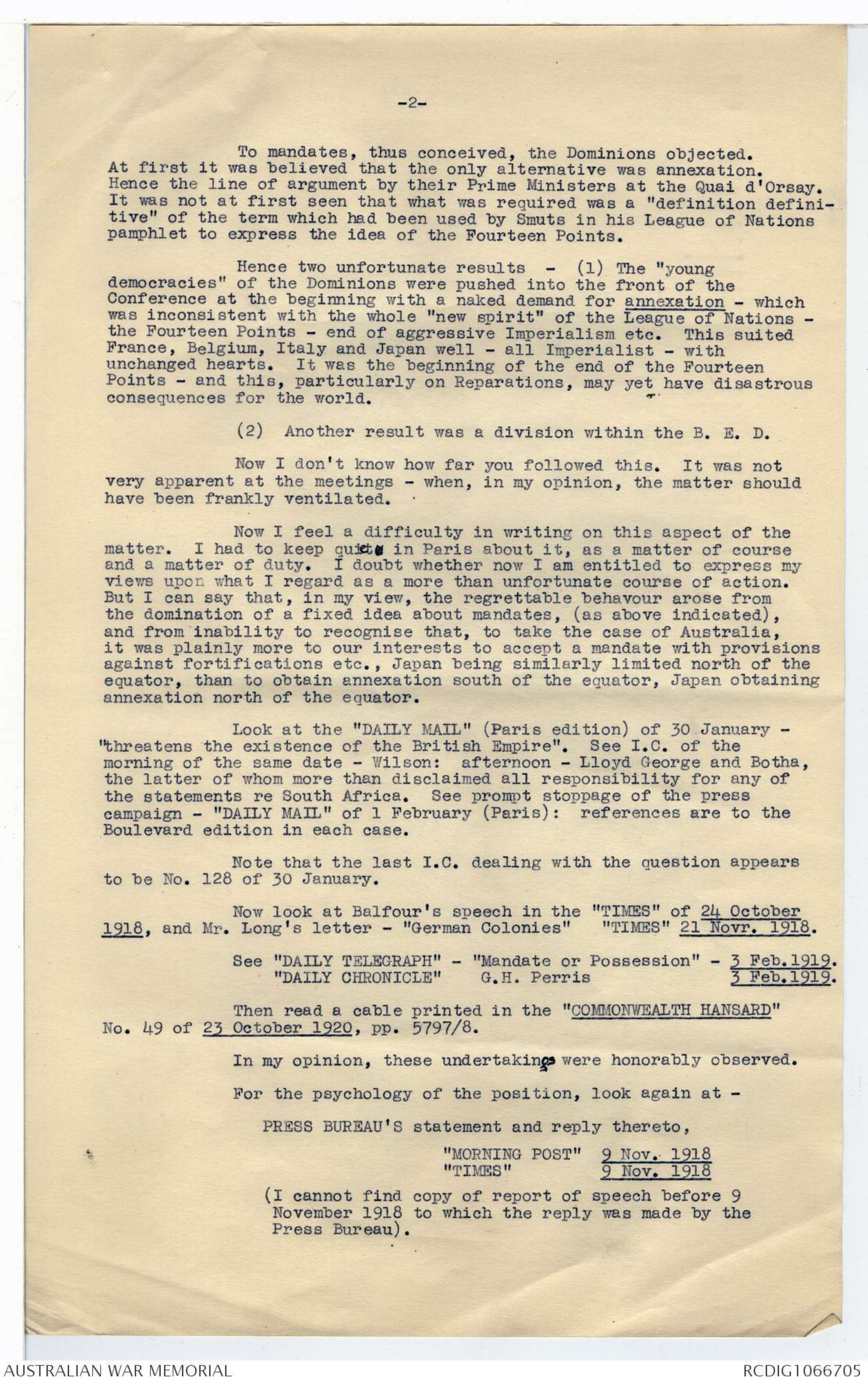
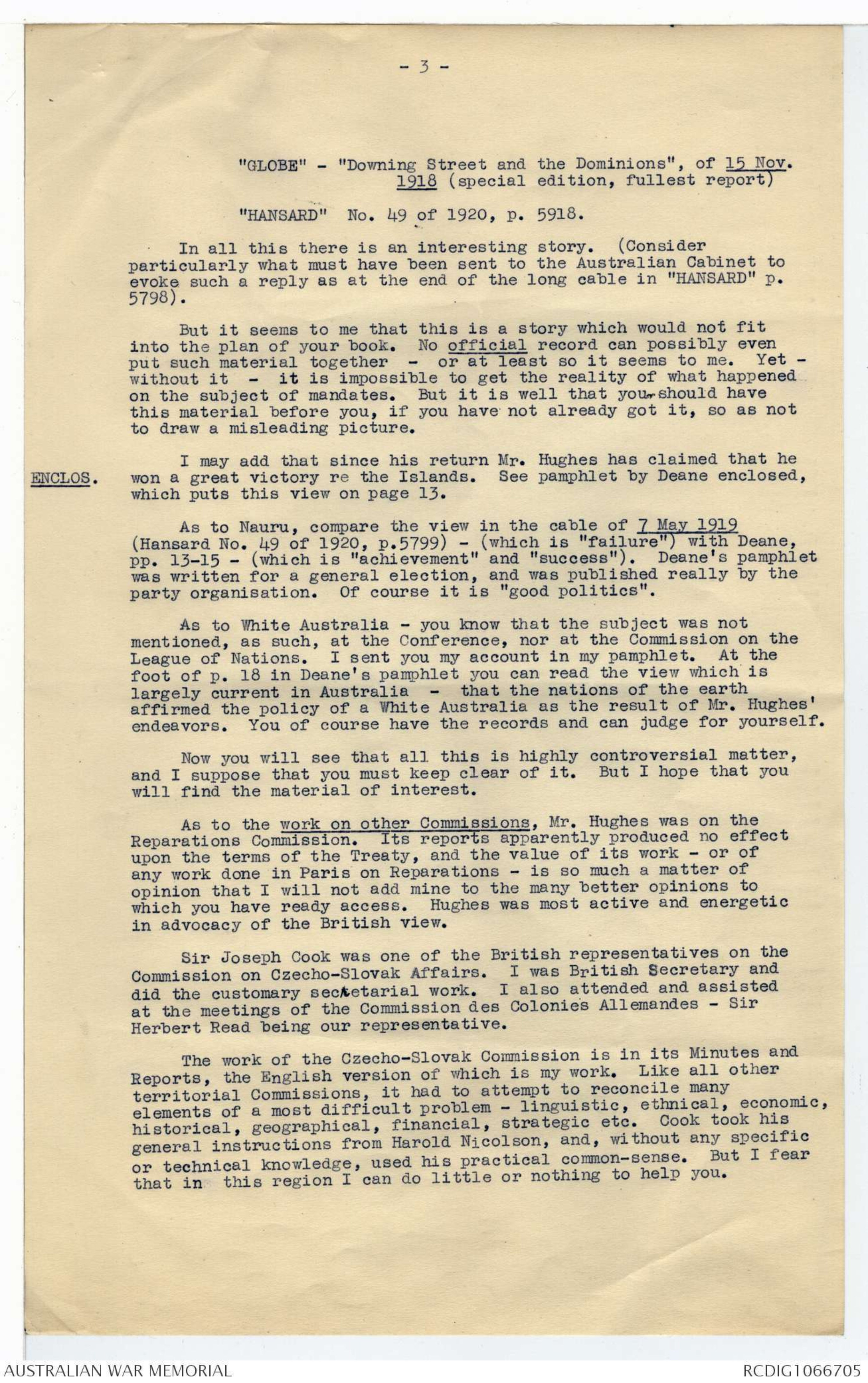
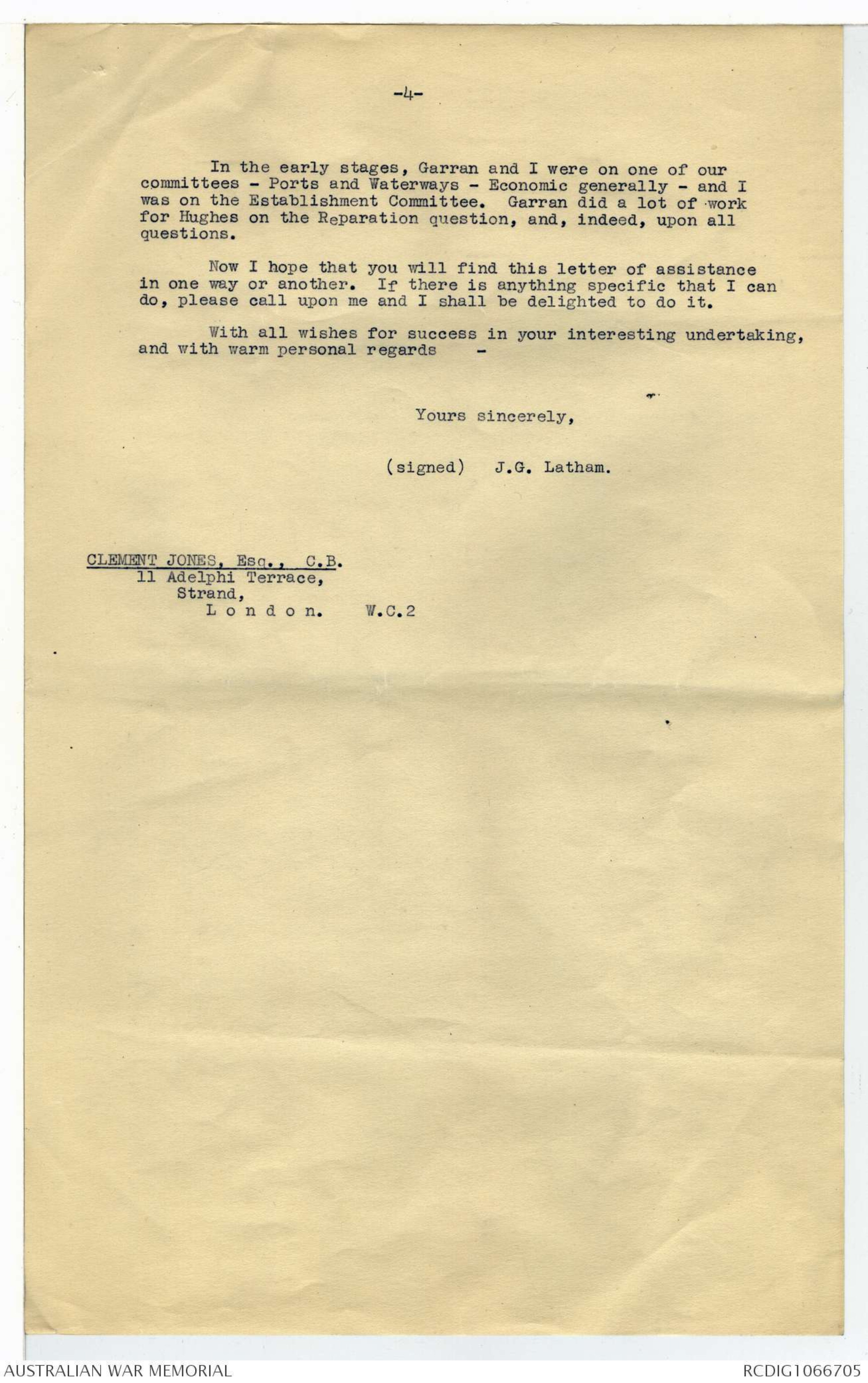
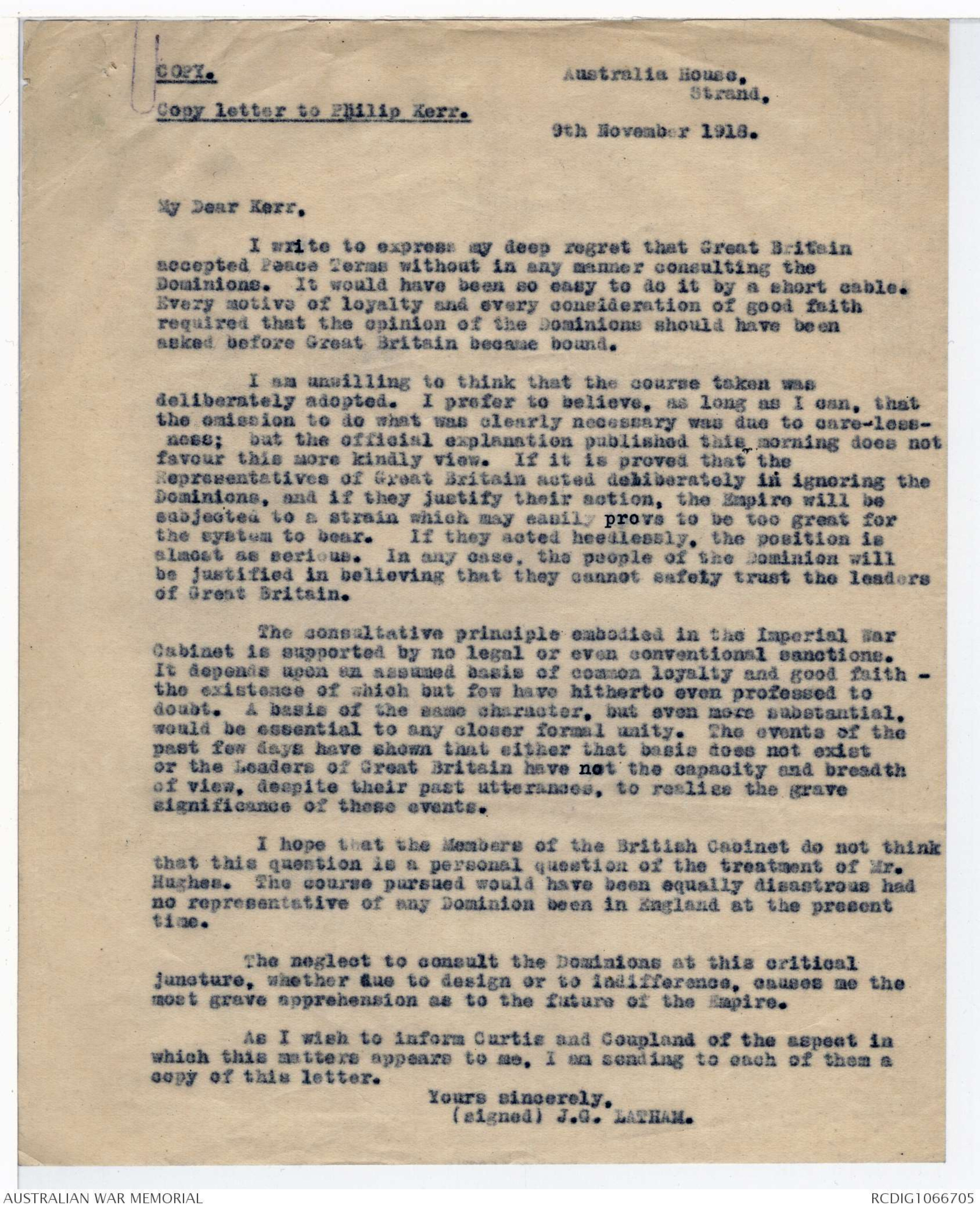
"Flete'
Flete Avenue,
MALVERN, S.E. 3.
22nd November,1935.
Dr. C.W. Bean, M.A.,B.C.L.,
Victoria Barracks,
SYDNEY.
My dear Bean,
With respect to mandates and Article 22 of the Covenant of the League
of Nations, the position in Paris was that the Dominions were very
apprehensive about any open door policy as applied to neighboring
territories. The result was that the arguments for the Dominions
assumed the form of a claim for annexation. Such a claim was
considered by everybody else to be obviously inconsistent with with the
Fourteen Points, and generally with the principle of "no annexations
and no indemnities" which was accepted as one of the basic principles of
the Peace Treaty.
Matters reached an acute stage. The Dominions would not recede
from the position they had taken up and it was impossible for the
other Powers to alter their position. Immediately after a meeting
of the British Empire Delegation at which the controversy had been
rather violent, I made a suggestion to Captain Clement Jones (who was
the Secretary of the British Empire Delegation) which was then and
there discussed between us and L.C. Christie (External Affairs Officer,
Canada) and Sir Maurice Hankey. I pointed out that a great deal of
discussion was taking place upon the assumption that a mandate
necessarily meant an open door both for immigration and trade. I said
that, after all, a mandate could mean what the Conference said it meant,
-2-
and that there had been up to the present time no official definition
of mandates. Article 22 then included the provisions which are now
in paragraphs 4 and 5 but it did not include paragraph 6. I sat
down and drafted what is now paragraph 6 dealing with the C Mandates,
I set out the characteristics of the territories in question -
sparseness of population etc. etc., which could be relied upon as
differentiating them from the other mandated territories. I remember
that after I had set out three or four matters I inserted as a matter
of caution the phrase "and other circumstances." Then I put in the
words "can best be administered under the laws of the mandatory as
portions of its territory", and I remember Hankey adding the word
"integral." I inserted the phrase "subject to the safeguards above
mentioned in the interests of the indigenous population." It was
this phrase that provided the solution. It incorporated into C
Mandates all the provisions which were directed to the protection of
the interests of the natives, but it was drafted so as not to include
the advantages which were conferred upon "other members of the League”
by securing "equal opportunities for their trade and commerce" (see
end of paragraph 5 of article 22). Further, the provision that the
territory could be administered "under the laws of the mandatory as
integral portions of its territory" safeguarded Australia from an
embarrassing and perhaps dangerous influx of Asiatic peoples into
the islands, because this phrase made it possible to apply our
immigration laws in the mandated territories.
When this clause had been worked out after discussion between us,
Hankey said he thought that it met the case. He told me that he
took it to Lloyd George who was impressed by it and that Lloyd George
-3-
then submitted it to the Dominion Prime Ministers and they all
accepted it.
What I have written is based upon my recollection as refreshed by a
recent conversation with Hankey, but also as confirmed by some
correspondence at the time. I send to you herewith a letter dated
31 January, 1921 which I wrote to Clement Jones. He had been asked
to write a history of the work of the British Empire Delegation at
the Peace Conference. He wrote it and his draft was circulated,
but the Prime Minister of Australia objected to its publication and
it was never published. The letter refers to the question of mandates.
I was rather modest in what I wrote to Clement Jones - in fact I
originated the suggestion and did the drafting.
The same letter deals with the story of the settlement of the
armistice terms without any consultation with the Dominions, and as to
this subject I include a memorandum which contains notes for an address
which I gave to the Round Table group in London on 21st November 1918.
This address was given on account of a letter I had written to
Phillip Kerr (now the Marquis of Lothian) on this subject. At the
time there was very strong feeling about it. You may be interested
to read my letter and notes. I think I have the material referred
to in them.
I have felt some difficulty in ever saying very much about the Papua Pacific
Islands mandate. In the case of mandates I did my best to help
Mr. Hughes, but I thought that he was making a great mistake in
asking for annexation of islands south of the Equator. One important
consideration was the fact that Australia was a party to an agreement
-4-
to support the Japanese claims to the islands north of the Equator.
Australia was not in a position to ask in respect of the southern
islands for anything which she was not prepared to agree to Japan
having in respect of the northern islands. It seemed to me that
(apart altogether from other aspects of the matter) it was obviously
a mistake to have Japanese and Australian possessions adjacent in the
Pacific and that it was far better to have a demilitarised mandatory
area between us. However this was not the view of Mr. Hughes, and
accordingly I have regarded myself as not at liberty to say very much
on the matter.
You ask me about Reparations. You will find a full account of what
took place on the Reparations Commission in the minutes of that body,
which I presume you have. I have not turned them up - I am not sure
that I have them - but my recollection is that Mr. Hughes' position
was that England had sold the pass by the terms of the Armistice which
excluded war costs, but that he put up a strong fight for the contrary
view before the Commission: that his contention was rejected: but that
the Commission accepted what I have always regarded as the astonishing
argument of Smuts that the capitalised amount of the war pensions was
damage caused to the civilian population of the Allies by Germany's
aggression by sea by land and by air. The acceptance of this
contention was responsible for one of the greatest errors in the
Treaty. If you have not got the minutes of the Reparations Commission
I suggest that you should obtain them from the Government and read them
for yourself. Probably you will find that the substance of them
is set out in Ray Stannard Baker's book "Woodrow Wilson and World
-5-
Settlement".
I hope that these notes will be useful to you.
Kindest regards,
Yours sincerely,
JG Latham.
(Copy.)
Selborne Chambers, Chancery Lane,
Melbourne.
31st January, 1921.
My dear Clement Jones -
During vacation - which has just ended - I
refreshed my memory as to the work of the B. E. D. on Mandates. The
conditions were not favorable for writing, as I was far away in the
mountains, camping out - about 200 miles from a railway, and far from
civilisation.
Upon reflection, I find it difficult to do
much that may help you. I think that you have undertaken a highly
difficult task. That of the official or semi-official chroniclers of
the Conference is relatively easy - for at least they can deal, from
many points of view, with the decisions which were reached. But the
decisions of the B. E. D. were not in themselves results with any
character of finality. The meetings served two objects - first,
consultation upon the ends to be achieved in British interests - general
determination of policy; second, consultation upon the means to be
adopted to achieve those ends - by suitable persuasion, and, if necessary,
compromise, with the representatives of other Powers.
In so far as the "ends" were not completely
achieved, there are, I should suppose, objections to revealing our
failures. As to the "means - e.g. I recall one occasion upon which
Lloyd George very skilfully indicated the difficulties of Clemenceau
himself, and his own difficulties with Clemenceau - this material
again is not very suitable for very available for publication.
However, it is needless for me to write to you
of difficulties of which you are doubtless only too well aware.
Now - as to Mandates. You have our Minutes
and the I.Cs. You need nothing from me upon the use of this material.
The difficulty will be to get colour into the narrative under the
conditions under which you must work.
You also have the W.C.Ps. of Balfour and
Milner and others and you remember how you and Christie and myself
(? on 29 January 1919) - and I think Hankey was there part of the time -
got on to the point that a suitable definition of "mandate", with
variations for different classes of colonies, would probably solve the
difficulty. Our drafting of the final clause of what is now Article
XXIII of the Covenant of the League of Nations was the beginning of that
Article, I think.
The difficulty re mandates largely arose from
the fact that nobody knew what a mandate was. The term - like "self
determination" and some other American efforts in high policy - had no
definite content. The content came after discussion. The assumption
in the early discussions was, that a mandate involved administration by
the mandatory State, subject to some kind of international control.
See e.g. the antithesis stated by Hughes in the I.Cs. between "direct
government" and a mandatory system.
International control has failed everywhere -
Egypt, Congo, New Hebrides. It satisfies no-one and serves the interests
of no-one- least of all the interests of uncivilised natives.
-2-
To mandates, thus conceived, the Dominions objected.
At first it was believed that the only alternative was annexation.
Hence the line of argument by their Prime Ministers at the Quai d'Orsay.
It was not at first seen that what was required was a "definition definitive"
of the term which had been used by Smuts in his League of Nations
pamphlet to express the idea of the Fourteen Points.
Hence two unfortunate results - (1) The "young
democracies" of the Dominions were pushed into the front of the
Conference at the beginning with a naked demand for annexation - which
was inconsistent with the whole "new spirit" of the League of Nations -
the Fourteen Points - end of aggressive Imperialism etc. This suited
France, Belgium, Italy and Japan well - all Imperialist - with
unchanged hearts. It was the beginning of the end of the Fourteen
Points - and this, particularly on Reparations, may yet have disastrous
consequences for the world.
(2) Another result was a division within the B. E. D.
Now I don't know how far you followed this. It was not
very apparent at the meetings - when, in my opinion, the matter should have been frankly ventilated.
Now I feel a difficulty in writing on this aspect of the
matter. I had to keep quiete in Paris about it, as a matter of course
and a matter of duty. I doubt whether now I am entitled to express my
views upon what I regard as a more than unfortunate course of action.
But I can say that, in my view, the regrettable behavour arose from
the domination of a fixed idea about mandates, (as above indicated),
and from inability to recognise that, to take the case of Australia,
it was plainly more to our interests to accept a mandate with provisions
against fortifications etc., Japan being similarly limited north of the
equator, than to obtain annexation south of the equator, Japan obtaining
annexation north of the equator.
Look at the "DALLY MAIL" (Paris edition) of 30 January -
"threatens the existence of the British Empire". See I.C. of the
the same date - Wilson: afternoon - Lloyd George and Botha,
the latter of whom more than disclaimed all responsibility for any of
the statements re South Africa. See prompt stoppage of the press
campaign - “DAILY MAIL" of 1 February (Paris): references are to the
Boulevard edition in each case.
Note that the last I.C. dealing with the question appears
to be No. 128 of 30 January.
Now look at Balfour's speech in the "TIMES" of 24 October
1918, and Mr. Long's letter - "German Colonies” “TIMES” 21 Novr. 1918.
See "DAILY TELEGRAPH" - "Mandate or Possession'- 3 Feb. 1919.
"DAILY CHRONICLE" G.H. Perris 3 Feb. 1919.
Then read a cable printed in the "COMMONWEALTH HANSARD”
No. 49 of 23 October 1920. pp. 5797/8.
In my opinion, these undertakings were honorably observed.
For the psychology of the position, look again at -
PRESS BUREAU'S statement and reply thereto,
"MORNING POST" 9 Nov. 1918.
"TIMES" 9 Nov. 1918.
(I cannot find copy of report of speech before 9
November 1918 to which the reply was made by the
Press Bureau).
- 3 -
"GLOBE" - "Downing Street and the Dominions", of 15 Nov.
1918 (special edition, fullest report
"HANSARD" No. 49 of 1920, p. 5918.
In all this there is an interesting story. (Consider
particularly what must have been sent to the Australian Cabinet to
evoke such a reply as at the end of the long cable in "HANSARD" p.
5798).
But it seems to me that this is a story which would not fit
into the plan of your book. No official record can possibly even
put such material together - or at least so it seems to me. Yet -
without it - it is impossible to get the reality of what happened
on the subject of mandates. But it is well that you-should have
this material before you, if you have not already got it, so as not
to draw a misleading picture.
[*ENCLOS.*]
I may add that since his return Mr. Hughes has claimed that he
won a great victory re the Islands. See pamphlet by Deane enclosed,
which puts this view on page 13.
As to Nauru, compare the view in the cable of 7 May 1919
(Hansard No. 49 of 1920, p.5799) - (which is "failure") with Deane,
pp. 13-15 - (which is "achievement" and "success"). Deane's pamphlet
was written for a general election, and was published really by the
party organisation. Of course it is "good politics".
As to White Australia - you know that the subject was not
mentioned, as such, at the Conference, nor at the Commission on the
League of Nations. I sent you my account in my pamphlet. At the
foot of p. 18 in Deane's pamphlet you can read the view which is
largely current in Australia - that the nations of the earth
affirmed the policy of a White Australia as the result of Mr. Hughes'
endeavors. You of course have the records and can judge for yourself.
Now you will see that all this is highly controversial matter,
and I suppose that you must keep clear of it. But I hope that you
will find the material of interest.
As to the work on other Commissions, Mr. Hughes was on the
Reparations Commission. Its reports apparently produced no effect
upon the terms of the Treaty, and the value of its work - or of
any work done in Paris on Reparations - is so much a matter of
opinion that I will not add mine to the many better opinions to
which you have ready access. Hughes was most active and energetic
in advocacy of the British view.
Sir Joseph Cook was one of the British representatives on the
Commission on Czecho-Slovak Affairs. I was British Secretary and
did the customary sectetarial work. I also attended and assisted
at the meetings of the Commission des Colonies Allemandes - Sir
Herbert Read being our representative.
The work of the Czecho-Slovak Commission is in its Minutes and
Reports, the English version of which is my work. Like all other
territorial Commissions, it had to attempt to reconcile many
elements of a most difficult problem - linguistic, ethnical, economic,
historical, geographical, financial, strategic etc. Cook took his
general instructions from Harold Nicolson, and, without any specific
or technical knowledge, used his practical common-sense. But I fear
that ing this region I can do little or nothing to help you.
-4-
In the early stages, Garran and I were on one of our
committees - Ports and Waterways - Economic generally - and I
was on the Establishment Committee. Garran did a lot of work
for Hughes on the Reparation question, and, indeed, upon all
questions.
Now I hope that you will find this letter of assistance
in one way or another. If there is anything specific that I can
do, please call upon me and I shall be delighted to do it.
With all wishes for success in your interesting undertaking,
and with warm personal regards -
Yours sincerely,
(signed) J.G. Latham.
CLEMENT JONES, Esq., C.B.
11 Adelphi Terrace,
Strand,
London. W.C.2
COPY.
Australia House,
Strand,
Copy letter to Philip Kerr.
9th November 1918.
My Dear Kerr,
I write to express my deep regret that Great Britain
accepted Peace Terms without in any manner consulting the
Dominions. It would have been so easy to do it by a short cable.
Every motive of loyalty and every consideration of good faith
required that the opinion of the Dominions should have been
asked before Great Britain became bound.
I am unwilling to think that the course taken was
deliberately adopted. I profer to believe, as long as I can, that
the omission to do what was clearly necessary was due to carelessness;
but the official explanation published this morning does not
favour this more kindly view. If it is proved that the
Representatives of Great Britain acted deliberately in ignoring the
Dominions, and if they justify their action, the Empire will be
subjected to a strain which may easily prove to be too great for
the system to bear. If they acted heedlessly, the position is
almost as serious. In any case, the people of the Dominion wil
be justified in believing that they cannot safely trust the leaders
of Great Britain.
The consultative principle embodied in the Imperial War
Cabinet is supported by no legal or even conventional sanctions.
It depends upon an assumed basis of common loyalty and good faith-
the existence of which but few have hitherto even professed to
doubt. A basis of the same character, but even more substantial,
would be essential to any closer formal unity. The events of the
past few days have shown that either that basis does not exist
or the Leaders of Great Britain have not the capacity and breadth
of view, despite their past utterances, to realise the grave
significance of these events.
I hope that the Members of the British Cabinet do not think
that this question is a personal question of the treatment of Mr.
Hughes. The course pursued would have been equaily disastrous had
no representative of any Dominion been in England at the present
time.
The neglect to consult the Dominions at this critical
juncture, whether due to design or to indifference, causes me the
most grave apprehension as to the future of the Empire.
As I wish to inform Curtis and Coupland of the aspect in
which this matters appears to me, I am sending to each of them a
copy of this letter.
Yours sincerely,
(signed) J.G. LATHAM.
 Sam scott
Sam scottThis transcription item is now locked to you for editing. To release the lock either Save your changes or Cancel.
This lock will be automatically released after 60 minutes of inactivity.